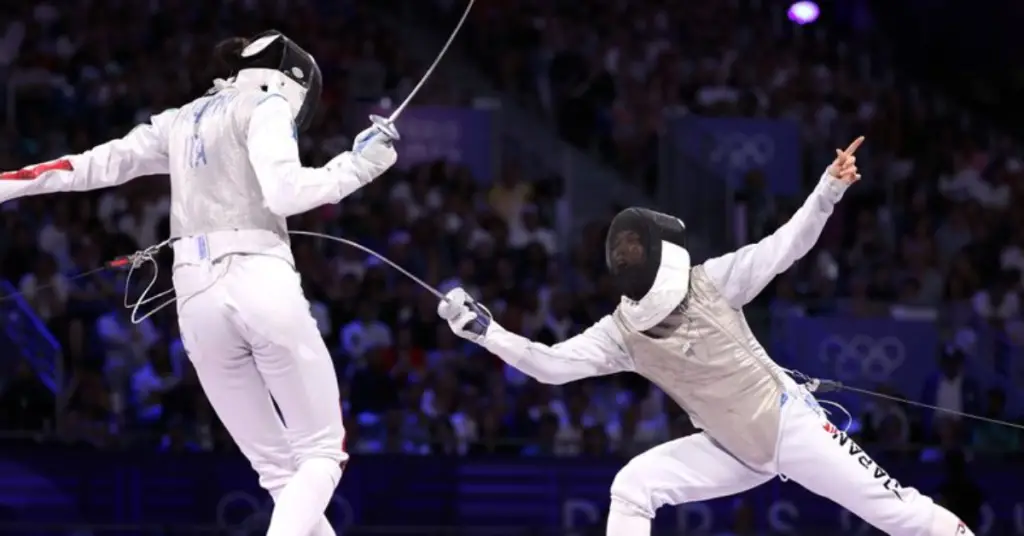Stephanie Turner, an American fencer, recently found herself at the center of a heated controversy after being disqualified from a women’s fencing tournament in Maryland, USA. The cause of her disqualification was her refusal to face an opponent she claimed was transgender.
Turner, who was competing in the event as part of a larger tournament, was handed a black card, signaling her disqualification from not only the match but also any further rounds of the competition.
This decision came after Turner took a knee in protest against her opponent, making it clear that she was not willing to compete against someone she considered to be outside of the traditional category of women’s sports.
The incident quickly made headlines, sparking a larger conversation about the inclusion of transgender athletes in women’s sports. In her comments to the media, Turner expressed her belief that allowing transgender athletes to compete in women’s events creates an unfair advantage. “This person is a man, and I’m a woman,” Turner was quoted as saying in an interview with Fox News.
Her words highlighted her firm stance on the issue, which she believes has become a divisive topic in modern sports. Turner also mentioned that her views on the inclusion of transgender athletes had led to a significant shift in her political beliefs, saying she had moved from being a lifelong Democrat to a “new Republican conservative” due to her strong views on the matter.
Explaining her decision to refuse to face her opponent, Turner stated that she felt compelled to take action because USA Fencing, the official governing body of the sport in the United States, had not listened to the concerns raised by female athletes regarding the organization’s gender eligibility policy. Turner revealed that she had been frustrated by the lack of action on this issue, and this tournament provided her with an opportunity to make a public statement.

She said that when the competition began, her opponent was under the impression that Turner would go ahead and fence. However, Turner had other plans. “I knew what I had to do because USA Fencing had not been listening to women’s objections regarding,” Turner explained. “I took a knee immediately at that point.”
Turner further explained the moment she took a knee during the competition. She described how her opponent did not immediately understand why she had stopped and walked over to her, asking if she was okay. Turner, however, had no intention of continuing the match.
“He was under the impression that I was going to start fencing. So when I took the knee, I looked at the ref and I said, ‘I’m sorry, I cannot do this. I am a woman, and this is a man, and this is a women’s tournament. And I will not fence this individual,’” she explained. Although her opponent seemed confused, Turner made it clear that her decision was firm. She added that while she respected her opponent, she would not participate in the match.
The ruling from USA Fencing, which ultimately led to her disqualification, was based on the organization’s official rules. USA Fencing stated that no fencer is allowed to refuse to compete against another properly entered fencer, regardless of the reason.
This rule is intended to maintain the integrity of the sport and ensure that all competitors are given a fair opportunity to participate. According to the official statement from USA Fencing, Turner’s disqualification was not related to her stance on transgender athletes but solely because she refused to compete against her opponent. The governing body clarified that such actions were not permissible within the competition rules.
Despite the controversy surrounding the incident, many media outlets took varying approaches in their coverage of the event. Fox News, for example, identified Turner’s opponent by name, while other organizations, such as The Associated Press, chose not to reveal the fencer’s name or gender identity. The Associated Press explained that the individual had not yet commented publicly on the incident or clarified their gender identity. This decision to withhold the name was, in part, a measure to respect the opponent’s privacy.
As the story continued to unfold, many questioned the fairness of including transgender athletes in women’s sports. Supporters of Turner’s position argue that the biological differences between men and women give transgender women a competitive advantage in certain sports.
They claim that the inclusion of transgender athletes in women’s events undermines the integrity of female athletics. On the other hand, advocates for transgender inclusion in sports emphasize the importance of equal opportunity and the right of transgender individuals to compete in accordance with their gender identity.
Turner’s stance and her disqualification have sparked widespread debate. The issue of transgender athletes in women’s sports has become increasingly prominent in recent years, especially as more transgender individuals have sought to participate in competitive events.
Critics of the current policies argue that allowing transgender women to compete in women’s categories can result in unfair competition. Supporters, however, say that inclusion is essential for promoting equality and fairness for all athletes, regardless of gender identity.
Turner’s bold decision to take a knee and protest during the match has made her a polarizing figure in the debate over transgender inclusion in sports. For some, her actions represent a courageous stand against what they view as an injustice, while for others, they represent a divisive stance that undermines the progress toward greater inclusivity in sports.
In the wake of this incident, many are calling for a reassessment of the policies surrounding transgender athletes in sports. Organizations like USA Fencing will likely face increased pressure to address the concerns of female athletes who feel that their rights and opportunities are being compromised by the inclusion of transgender women in women’s events. This is an issue that is likely to continue to be a topic of discussion in the coming years, as the landscape of competitive sports continues to evolve and adapt to new challenges.
As for Turner, she remains steadfast in her views, and her actions have made her a key figure in the ongoing debate. While her disqualification has sparked controversy, it has also put a spotlight on the complex and sensitive issue of gender in sports, one that will undoubtedly continue to shape the future of competitive athletics.
Disclaimer: This article has been meticulously fact-checked by our team to ensure accuracy and uphold transparency. We strive to deliver trustworthy and dependable content to our readers.




